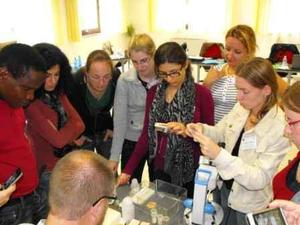Europe
November 22, 2012
Exploring the extent to which agroecology could be used for crop protection on European farms was the task set for the fourth ENDURE Summer School, which brought together 12 PhD students and five expert teachers for a five-day course in Italy.

The focus was on the application of agroecological principles to cropping systems and how the management of weeds, pests and diseases can be jointly addressed to exploit synergies and avoid negative interactions among management practices. The idea underlying this approach is that successful Integrated Pest Management (IPM) should not merely be based on ‘substitution’, in other words simply replacing chemical pest control with single mechanical or biological tactics.
In this report:
Historically, the organisers noted, there has been a wealth of work at the level of agroecological principles and the observation of agroecosystemic processes at work in family farms in the developing world. In contrast, the applicability of agroecology in average European-style farms is still in its infancy and the course sought to explore the extent to which agroecology can be exploited in this context.
This was achieved through a programme alternating classical lectures with teamwork and exercises in which students were stimulated to apply knowledge in an interdisciplinary way.
The lectures provided an overview of agroecology and IPM as well as more focused agroecological avenues relative to the management of plant diseases, weed communities, and insect pests. Marco Barzman (INRA) and Alain Ratnadass (CIRAD) covered the North and South American origins of agroecology, how it has been introduced to Europe, and the numerous forms it has taken - ranging from a social movement to a scientific discipline - and the relationship between IPM and agroecology.
Stefan Kühne (JKI) provided some clues for the management of insect pests drawing on plant protection in organic farming, the special case of predatory flies used in greenhouses, and also reported on a long-term work on hedges and field margins to increase biodiversity. Alain Ratnadass provided detailed reports of tropical experiences with direct-seeding mulch-based conservation agriculture against striga and white grubs in rice, push-pull strategies against insect pests in Niger, and agroforestry against the plant bug and brown pod rot in cocoa in Cameroon, and against the coffee berry borer and orange rust in coffee in Costa Rica.
Paolo Barberi (SSSA) explained how Integrated Weed Management based on diversifying cropping systems and weed control strategies offered agroecological solutions to control weeds in both conventional and organic systems and pointed to a better understanding of how multi-trophic interactions affect weed communities as the next research frontier in this area. Sabine Ravnskov (AU) explored the range of tactics available and our growing understanding of the importance of mycorrhizae for non-chemical disease control.
Full article